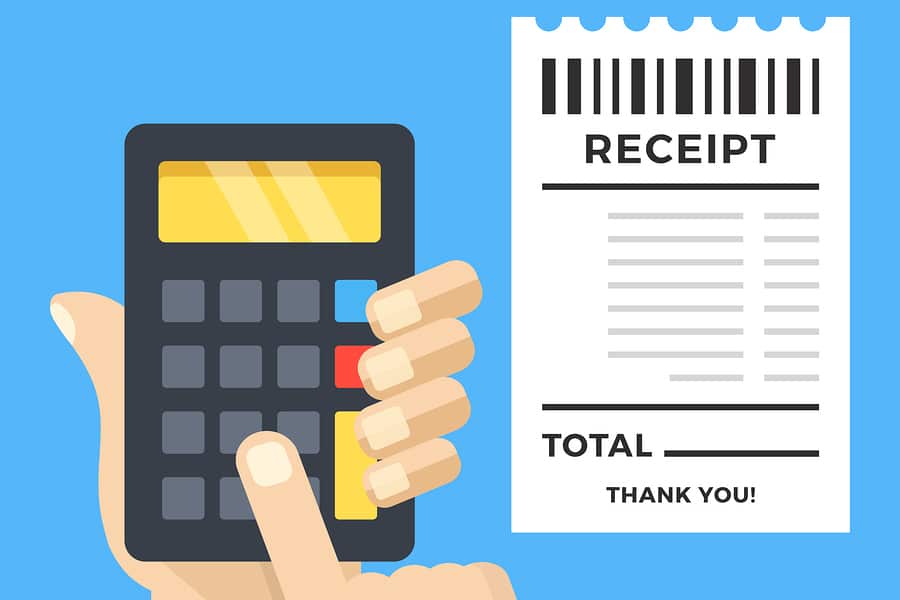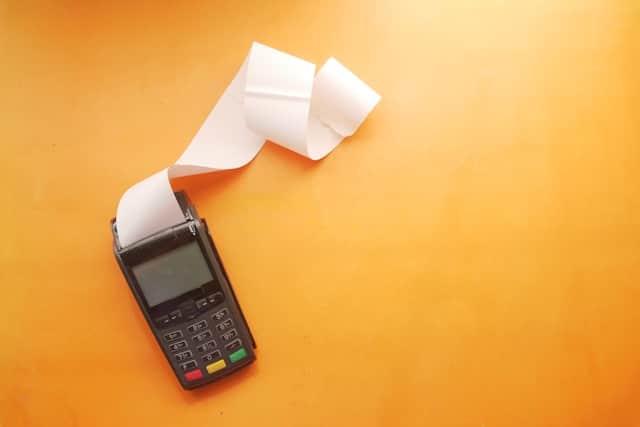9 Small Business Tax Deductions You Need to Know

Updated January 24, 2022
Small business tax deductions and write-offs are too important to overlook. To take advantage of small business tax deductions by:
- Keep good records
- Hire a tax accountant
- Pay attention to deadlines
Let’s discuss 9 categories of small business tax deductions. Note that there is some overlap.
9 Small Business Tax Deductions
1. Business Vehicles
Does your business own vehicles? Tax deductions for these vehicles can include:
- Purchase or lease of car, truck, van
- Fuel
- Repairs/maintenance
- Parking/tolls
- Mileage (either actual cost or the standard rate). The standard mileage rate for the 2021 tax year is 56 cents per mile.
NOTE: You can’t use the standard mileage rate if you have used the depreciation method under Modified Accelerated Cost Recovery System (MACRS).
In addition, there are some nuances to maximum mileage write-offs. Let’s use an example for an electrical contractor who works at several locations in a typical day. The contractor can’t write off driving from home to and from the first work location. He can, generally, write off mileage for trips he takes during the day after arriving at the first worksite.
2. Home Office
Many small business owners and employees moved their work home after office buildings were closed. One of the few bright spots in the whole pandemic situation is that you can write off a portion of home office expenses. For example, if your office is about a 10th of the square footage of the home, you can typically write off a 10th of the expenses.
- Rent/mortgage
- Mortgage interest
- Utilities
- Renovations
- Maintenance
Home office rules are complex. As such, they are a common small business tax pitfall. Know IRS rules. For example, you need a dedicated area where you work. If you take business calls throughout the day in several areas of the house, it doesn’t mean you can write off the expenses for the equivalent square footage.
3. Equipment/Supplies
- Tools
- Materials
- Equipment
- Office supplies
TIP: Don’t assume a credit card statement is sufficient proof of a business expense.
Credit card or bank account statements show the name of a vendor, amount of the sale, and date. But it doesn’t show the item purchased. Print off the actual order to verify that the item purchased was a qualified business expense. This will also help you avoid compliance issues with reimbursable expenses.
4. Insurance
In many states, you can’t operate a business without insurance. Make sure you take advantage of insurance tax write-offs:
- Equipment insurance
- Malpractice insurance
- Auto insurance for business vehicles
5. Business Services
Small businesses keep other companies in business. Don’t overlook any expenses for the following services:
- Accounting
- Bookkeeping
- Payroll processors
- Cleaning services
- Bank fees
- Marketing and advertising services
6. Employees/Contractors
Having employees entitles you to a myriad of tax deductions, including:
- Wages
- Bonuses
- Commissions
- Meals
- Travel expenses
- Lodging
- Airfare
- Rental car
TIP: During new hire onboarding, have employees fill out a W-9 BEFORE you pay them.
7. Work-Related Training/Education
Did you pursue professional development last year? (Kudos to you if you did!) For example, if you took a course to learn QuickBooks, you can write off the expense.
8. Unreimbursed Theft
If your business was the victim of theft, you can generally write off any cost that was not reimbursed by insurance.
9. Charitable Donations
There are countless opportunities to lend a helping hand. If you donated money, real property, or supplies, don’t forget to write them off.
TIP: Make sure any organization you support qualifies under IRS rules. Note that donating your time cannot be deducted.
3 Small Business Tax Deduction Tips For Newbies
1. Don’t Neglect to Hire a CPA Because You Want to Save Money
As early as possible, get a CPA. They will catch beginner mistakes that can plague you for years.
Additionally, get a bookkeeper who specializes in your type of business to set up your books or pay a CPA to set them up and take a few hours to fill you in. Like high quality materials and good contractors, you pay once and get years of savings and benefits.
2. Use a Mobile App to Scan Receipts
Use a document scanning app on smartphones and other mobile devices to scan and save receipts. Organize in general expense categories. File by tax year. In the app, you can easily locate any receipt you’ve scanned. NeatDesk, Expensify, Scanner Pro, and Evernote Scannable are popular small business apps. Many small business owners find them easier to use than Excel spreadsheets.
3. Use Google Maps if You Forgot to Track Mileage
A common rookie mistake for business travelers is not tracking mileage your first year in business. Some entrepreneurs don’t think about mileage until it’s time to file their business taxes. Though many of us curse the fact that Google knows our every move, this is one instance where it may come in handy. You can look at your Google maps location history to see when and where you traveled for business.
Once you get into the habit of tracking expenses (weekly, or monthly), it will become second nature. The first of the year is a good time to create expense report templates and workflows. Good accounting software can help you with both.
6 Key Findings About Small Business Tax Deductions and Expense Reports
Let’s discuss the small business expense reports you need to keep for taxes.
1. If you are a sole proprietor and you report a loss on your taxes, make sure you can document all business expenses. Be especially careful that you don’t claim personal expenses as business expenses.
2. Document cash payments and expenditures just as closely as non-cash transactions. Don’t assume the IRS can’t trace cash transactions. The IRS uses several methods to investigate cash-intensive businesses. One of these is comparative analyses of similar businesses. Consult BizStats for information about your industry to determine how you compare.
3. Most paper receipts are printed on thermal paper which fades quickly. Take a photo of receipts or have them emailed. Create a receipts folder on your computer. Print out emailed receipts. Back up your computer files regularly.
4. You can also use a document scanning app on your phone to scan and save receipts. Some will save to Dropbox. Make folders for general expense categories. File by tax year. Using search tools, you can easily locate any receipt you’ve scanned and saved. Examples of receipt scanning apps are NeatDesk, Expensify, Scanner Pro, and Evernote Scannable.
5. Many small business owners believe there is a 3-year statute of limitations on tax audits. The IRS can challenge your business taxes past the 3-year mark in many circumstances—especially if they believe you underreported business income.
6. Be safe and keep records longer than the IRS mandates. You may need to amend a prior year tax return. And you will need documentation if you are challenged by the IRS, a vendor, or a former employee. Expense management software can automatically track and store records.
How Long Do I Need to Keep Small Business Expense Reports?
The Small Business Administration recommends keeping many records permanently. Here are SBA recommendations for the most common small business records and expense tracking.
- Tax returns: forever
- Expense receipts: 3 years
- Employment tax records: 4 years
- Invoices and receivables: 5 years
- Checks and payables: 5 years
- Auditor reports: forever
- Annual statements: forever
- Inventory: 4 years
- Employee withholding: 7 years
- Payroll records: 6 years
- Personnel files: 3 years
- Employee timecards: 2 years
- Tax bills and statements: forever
- 1099s: forever
Small Business Expense Reports and Tax Recordkeeping FAQs
Q. If I use my phone for business and personal communication, can I write it off?
A. Only the business portion. Estimate the ratio of business to personal use and claim that portion of the costs for tax reimbursement. Save receipts for phone purchases and cell phone plan payments.
Q. Are credit card statements adequate for showing business expenses?
A. A credit card statement shows the name of a vendor, amount of the sale, and date. But it doesn’t show or certify the item purchased. Print off the actual order to verify that the item purchased was a legal business expense. This will also give you more visibility into your operating costs.
Q. Is it true that you don’t have to document business meals and travel expenses if the amount is less than $75?
A. Though this may be true in some situations, you still have to justify that the expense is ‘ordinary, necessary, and reasonable.’ To do this, you need to document the amount, the purpose, and the time and place you incurred the expense. Keep ALL receipts of business expenses even if the purchase is less than $75.
Q. Can I wait to pay my business taxes if I file for an extension?
A. No. You must pay the estimated tax amount by the deadline. The extension applies to your return, not the tax payment.
NOTE: The content provided on this website is for general guidance and informational purposes. This article is not intended to provide legal, business, or tax advice.
Simplify HR management today.
Simplify HR management today.
9 Best Receipt Apps for Small Businesses and Freelancers in 2024
As a business owner or freelancer, you’re spinning many plates at once. You’re keeping up with payroll, making pitches, nurturing your email marketing funnel, and much more. All to maintain and grow your business. The last thing you need is to panic each month as you look for receipts at expense report time. Administrative work…
Read MoreYour Guide to GPS Time Tracking (Geofencing)
Updated March 19, 2024 When your business has employees working remotely or at various job sites, time tracking can become a challenge, particularly if the company relies on physical clocks for punching in and out. But offering a mobile app or web-based tracking solution can cause some concerns. You might wonder whether employees are clocking…
Read More





